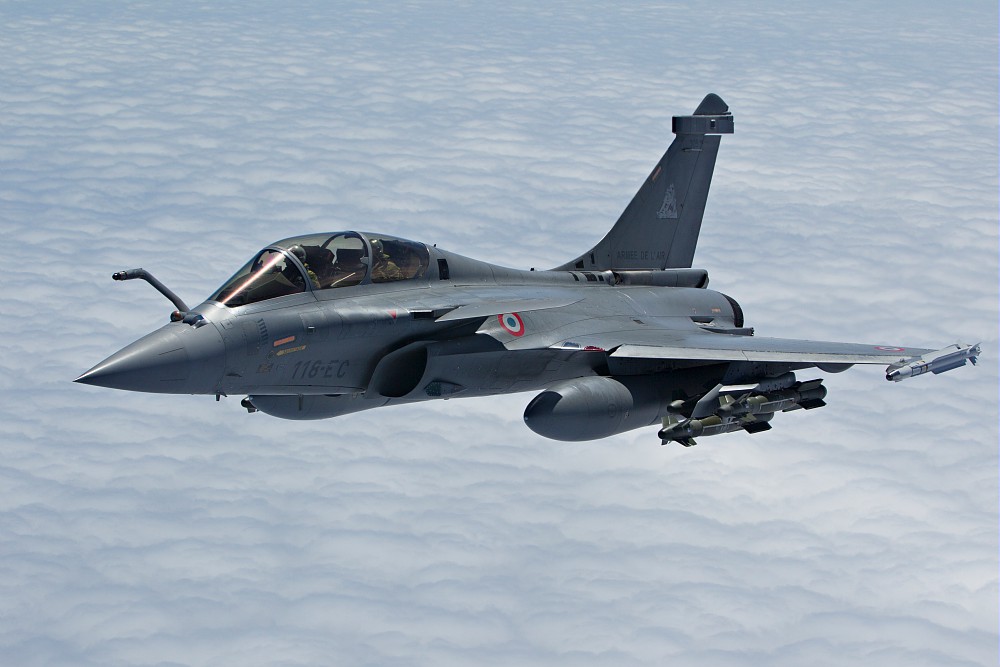The Supreme Court on Thursday gave clean chit to the Modi government on the purchase of 36 fully-loaded Rafale fighter jets from French company Dassault Aviation, rejecting the plea for registration of an FIR by the CBI for alleged commission of cognisable offence in the deal.
The apex court dismissed the pleas seeking review of the December 14, 2018, verdict which said there was no occasion to doubt the decision-making process in the procurement of 36 Rafale fighter jets.
'We find the review petitions are without any merit,' said a bench comprising Chief Justice Ranjan Gogoi and Justices S. K. Kaul and K. M. Joseph.
The rejection of review petitions is tantamount to the apex court giving the clean chit to the Modi government for the second time.
Reading out the judgement, Justice Kaul said the judges had reached the conclusion that it is not appropriate to order a roving inquiry into the allegations.
Maintaining that the review petitions have sought a registration of an FIR in connection with the Rafale fighter jet deal, the bench said: 'We do not consider it to be a fair submission. We do not find it appropriate to consider passing an order for registration of an FIR.'
Justice Joseph, who wrote a separate judgement, said he agreed with the main verdict written by Justice Kaul subject to certain aspects on which he has given his own reasons.
In December last year, the apex court had dismissed the petitions seeking an probe into the alleged irregularities in the Rs 58,000-crore deal.
On May 10, the apex court reserved its decision on the pleas, including one filed by former Union ministers Yashwant Sinha, Arun Shourie and activist-lawyer Prashant Bhushan, seeking a re-examination of its findings that there was no occasion to doubt the decision-making process in the procurement of 36 Rafale fighter jets.
Besides the trio, review petitions were also filed by lawyer Vineet Dhandha and Aam Aadmi Party lawmaker Sanjay Singh.
While reserving the judgement on the review petitions, the apex court had asked the Centre searching questions on its deal with France to buy 36 Rafale fighter jets on issues like 'waiver of sovereign guarantee' and the absence of technology transfer clause in the inter-governmental agreement (IGA).
The bench had referred to an earlier judgement which said an FIR is a must when information revealed the commission of cognisable offence.
Attorney-general K. K. Venugopal had told the bench that 'there has to be a prima facie case, otherwise they (agencies) cannot proceed. The information must disclose commission of cognisable offence'.
Justice Joseph had referred to the earlier deal and asked the Centre as to why the IGA on Rafale with the French administration does not have the clause of transfer of technology.
'The court cannot decide such technical aspects,' Venugopal had said in response.
On the court's question of waiver of sovereign guarantee by France in the IGA and its replacement with a letter of comfort, Venugopal said it is not an 'unprecedented practice'.
'It is a question of national security. No other court in the world will examine a defence deal on these kinds of arguments,' he had said.
Bhushan had submitted that the December 2018 judgement did not deal with the prayer seeking a probe into the deal and decided the petition on the premise that it is seeking cancellation of IGA.
He had contended that the Centre misled the court by referring to non-existent CAG report in November, 2018, hearing when it is on record that the report came later in February this year.
Bhushan had also alleged suppression of material facts from the court by the Centre and said that as many as eight critical clauses of the standard defence procurement procedure were dropped in the deal in the meeting of cabinet committee on security in September 2016.
One clause dealt with the aspect that the government can cancel the deal if the information of any involvement of middleman comes to the light, he had said.
Venugopal had vehemently opposed the submissions and sought dismissals of review petitions, saying the basic grounds of these pleas were the same as in the main case.
The government is under obligation to put defence material under cover, he had said, adding that 'when the security of the country is involved, you do not view it as a contract to build a highway or a dam.'










